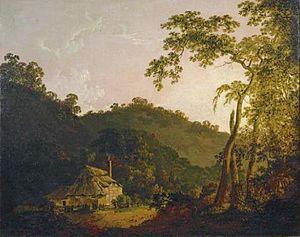Needwood Forest facts for kids
Quick facts for kids Needwood Forest |
|
|---|---|

A Cottage in Needwood Forest by Joseph Wright 1790
|
|
| Type | Woodland |
| Location | Staffordshire |
| Area | 9,437 acres (38.19 km2) |
| Created | 1266 |
| Status | Some parts remain |
Needwood Forest was once a very large area of old woodland in Staffordshire, England. Sadly, most of this beautiful forest was lost by the end of the 1700s.
Contents
A Forest's Long History
Needwood Forest was part of huge lands owned by the Berkeley family. Their home was Berkeley Castle in Gloucestershire. The forest was full of exciting wildlife, including many wild boar and fallow deer.
Hunting and Royal Connections
In the 1200s, a man named Thomas de Berkeley was put in charge of the Tutbury area. He lived at Tutbury Castle and loved to hunt in Needwood Forest. He even built a special hunting lodge called Byrkley Lodge. In 1267, Thomas married the daughter of William de Ferrers, who was the Earl of Derby.
Later, the de Ferrers family joined a rebellion against King Henry III. When the rebellion failed, the king took their lands, including Needwood Forest. In 1266, King Henry III gave the forest to his son, Edmund Crouchback, 1st Earl of Lancaster.
From Forest to Royal Chase
Edmund's son, Thomas, 2nd Earl of Lancaster, died without children in 1322. This meant the forest went back to the King. It was then renamed Needwood Chase, which was another name for a royal forest. It stayed under the control of the Duchy of Lancaster (a special royal land group) until King Henry IV took possession of it in 1399.
By this time, Byrkley Lodge had become the home of the local judge. King Edward IV improved the lodge, and both he and King James I used it a lot for hunting. It was around this time that Needwood Forest became famous for its connection to the legend of Sir Gawain and the Green Knight.
The Forest Disappears
In the late 1700s, people started talking about "enclosing" the forest. This meant dividing it up and cutting down the trees for other uses, like farming.
Efforts to Save the Forest
In 1776, a man named Francis Noel Clarke Mundy published a book of poems called "Needwood Forest". His main poem, also called "Needwood Forest," was written to try and stop the forest from being enclosed. Other famous writers like Erasmus Darwin and Anna Seward also contributed poems to support his cause. Anna Seward even wrote a poem called "The fall of Needwood Forest," which she thought was one of the most beautiful poems about a local place.
Another person who tried to protect the forest was Thomas Gisborne. He lived near Needwood and wrote about his walks there, hoping to prevent its destruction.
The Forest Is Divided
Despite these efforts, an Act of Parliament was passed in 1803. This law allowed special forestry officials to enclose the land and cut down the trees. By 1811, the land had been divided among many different people.
By 1851, Needwood Forest was mostly gone. It was described as a beautiful and well-farmed area. It covered about 9,437 acres (38.19 km2) of land across five different parishes: Hanbury, Tutbury, Tatenhill, Yoxall, and Rolleston. This area was divided into four smaller parts: Tutbury, Barton, Marchington, and Yoxall. Together, these parts formed a district about seven miles (11 km) long and three miles wide.
Needwood Forest Today
Today, the area that was once Needwood Forest is home to about twenty farms. Most of these farms focus on dairy farming, which means raising cows for milk.
Remaining Woodlands and New Projects
Sadly, Byrkley Lodge was taken down in 1953. Now, the land where it once stood is home to the English National Football Centre, called St George's Park.
About 490 acres (2.0 km2) of woodland still remain from the original forest. Some of these parts are open for people to visit. Jackson Bank near Hoar Cross is a mature, mixed woodland of 80-acre (320,000 m2). It is still owned by the Duchy of Lancaster and is open to the public. Bagot's Wood near Abbots Bromley is believed to be the largest remaining part of the old forest.
An exciting project called The National Forest is working to connect the ancient forests of Needwood and Charnwood. New trees are being planted across parts of Leicestershire, Derbyshire, and Staffordshire. The goal is to create a 200 square miles (520 km2) area that mixes old woodlands with new trees, forming a brand new national forest for everyone to enjoy.
Images for kids
 | Precious Adams |
 | Lauren Anderson |
 | Janet Collins |


